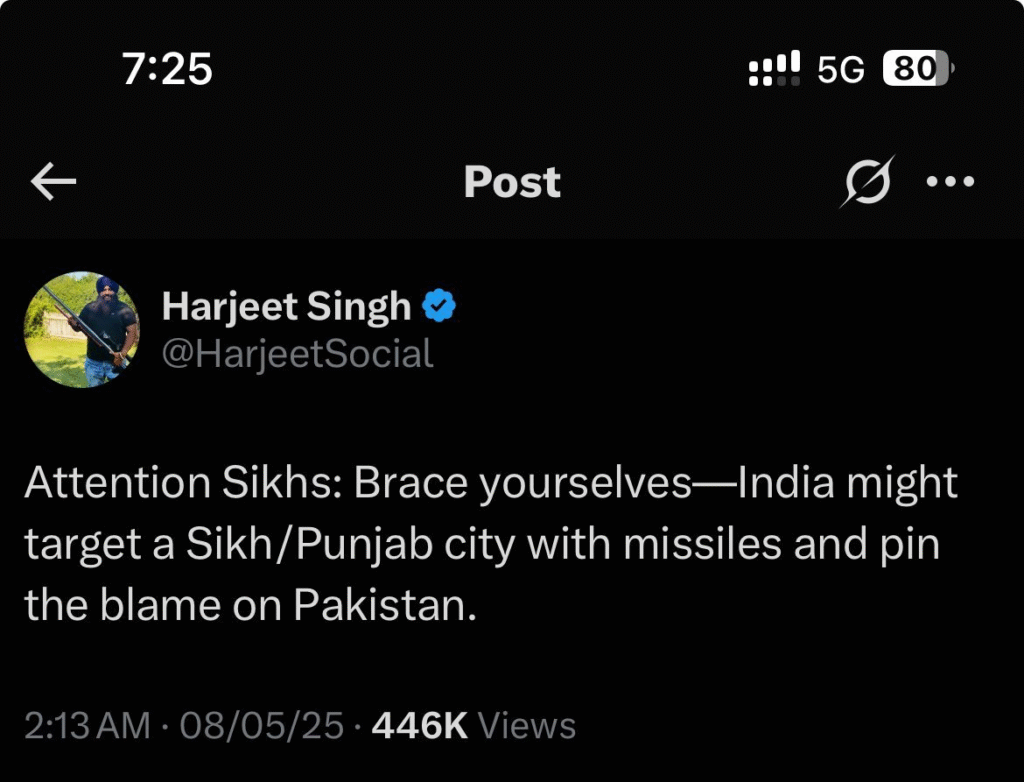AI Generated Summary
- In the dead of night on May 8, 2025, as Indian air defenses scrambled to intercept a barrage of Pakistani rockets and drones hurtling toward Punjab, a chilling truth was revealed—not just about Pakistan’s aggression, but about the astonishing silence and complicity of Khalistani groups like Sikhs for Justice (SFJ).
- Chatter suggests a coordinated attempt to blame India if the Golden Temple had been hit, with Khalistani operatives in the West prepared to launch a social media storm accusing New Delhi of sacrilege.
- In a video released after the attempted attack, he instead accused India of targeting mosques in Pakistan and audaciously suggested that Ayodhya should be Pakistan’s next “legitimate” target.
In the dead of night on May 8, 2025, as Indian air defenses scrambled to intercept a barrage of Pakistani rockets and drones hurtling toward Punjab, a chilling truth was revealed—not just about Pakistan’s aggression, but about the astonishing silence and complicity of Khalistani groups like Sikhs for Justice (SFJ). Among the intended targets was Amritsar, home to the Harmandir Sahib—the Golden Temple—the holiest shrine of Sikhism. While India shielded the sanctity of the site, the very group that claims to champion Sikh rights chose to side with its attackers.
This is no longer a matter of ideological divergence or political complexity. This is betrayal—plain and direct. When Pakistan sends rockets toward the Golden Temple and Khalistani leaders like Gurpatwant Singh Pannun continue to parrot pro-Pakistan rhetoric, one must ask: who are they truly fighting for?
Pakistan’s Sacred Line Was Crossed—And SFJ Remained Silent
Pakistan has long manipulated separatist movements in India to serve its strategic ends, using Khalistani groups as tools in a larger geopolitical game. But even the Pakistani military had, until now, avoided crossing a sacred line—targeting Sikh religious institutions.
That restraint ended when multiple rockets and drones, part of Pakistan’s “Operation Ghazwat-ul-Hind,” were intercepted en route to Amritsar, and several Pakistani shells were fired at Poonch. Although Indian defence forces warded off most of it, some shells were successful in creating some destruction in Poonch, especially the Gurdwara, and 4 sikhs succumbed to injuries.
The Golden Temple might have suffered the same fate, were it not for Indian defense systems.
Spoke to our Intel folks & confirmed with an air defence commander in Amritsar. At least two of the artillery rockets (and possibly some of the drones) intercepted yesterday were on a trajectory to hit the Golden Temple.
— Abhijit Iyer-Mitra (@Iyervval) May 8, 2025
This is curious because Pakistanis have carefully avoided… pic.twitter.com/DV9NGlK52S
Rather than condemn this violation of Sikh sanctity, Pannun doubled down. In a video released after the attempted attack, he instead accused India of targeting mosques in Pakistan and audaciously suggested that Ayodhya should be Pakistan’s next “legitimate” target. Nowhere in his message was there a single word of outrage over the threat to the Golden Temple. Not a whisper of solidarity with Sikhs who could have witnessed another desecration of their holiest site.
Aligning with the Aggressor
SFJ’s response has been worse than silence—it has been complicity. Pannun has repeatedly called on Sikhs in Punjab to support Pakistan, even claiming that Sikh youth are raising Pakistani flags in Indian schools and chanting anti-India slogans. He urges the Pakistani army to enter Indian territory, describing Punjab as Pakistan’s “backbone” in any future war. He begs Islamabad to globalize the Khalistan cause, promising undying support in return—even as Pakistan fires rockets at the very people Pannun claims to represent.
This is not just political opportunism—it is a deliberate distortion of Sikh identity for foreign interests.
A Scripted Blame Game?
Emerging news from sources and social media paints a more insidious picture. Chatter suggests a coordinated attempt to blame India if the Golden Temple had been hit, with Khalistani operatives in the West prepared to launch a social media storm accusing New Delhi of sacrilege. The blackout in Amritsar on May 8 may have been a desperate attempt to shield the shrine from such manipulation and misdirection.

Had Pakistan succeeded in damaging the Golden Temple, it would have ignited outrage across the Sikh world. And if the blame had been falsely placed on India, riots could have erupted. This is not resistance—this is provocation masquerading as activism.
The Price of Proxy Loyalty
Let us be clear: Khalistani groups like SFJ are not fighting for Sikh sovereignty. They are serving as mouthpieces for a foreign military that just tried to obliterate the spiritual heart of Sikhism. Their blind loyalty to Pakistan, even after an attempted attack on the Golden Temple, reveals the true nature of their agenda: not justice, not freedom, but geopolitical sabotage.
No cause—no referendum, no imagined state—can justify standing shoulder to shoulder with those who aim weapons at your most sacred sites. If the Khalistan groups cannot denounce an attempted missile strike on the Golden Temple, then it forfeits all claims to representing the Sikh people.
The Golden Temple stands today because India protected it. And yet, SFJ would have us believe Pakistan is the true ally.
The truth is now unmistakable: when rockets fly and loyalties are tested, Khalistan’s leaders have chosen their side—and it is not with Punjab.




